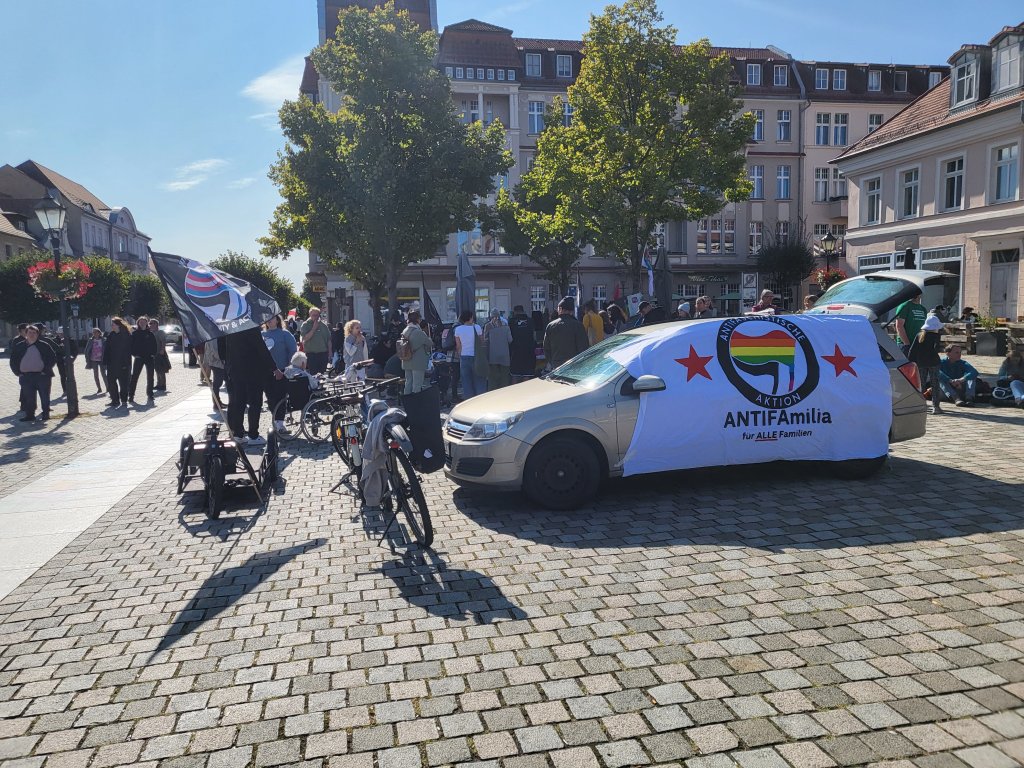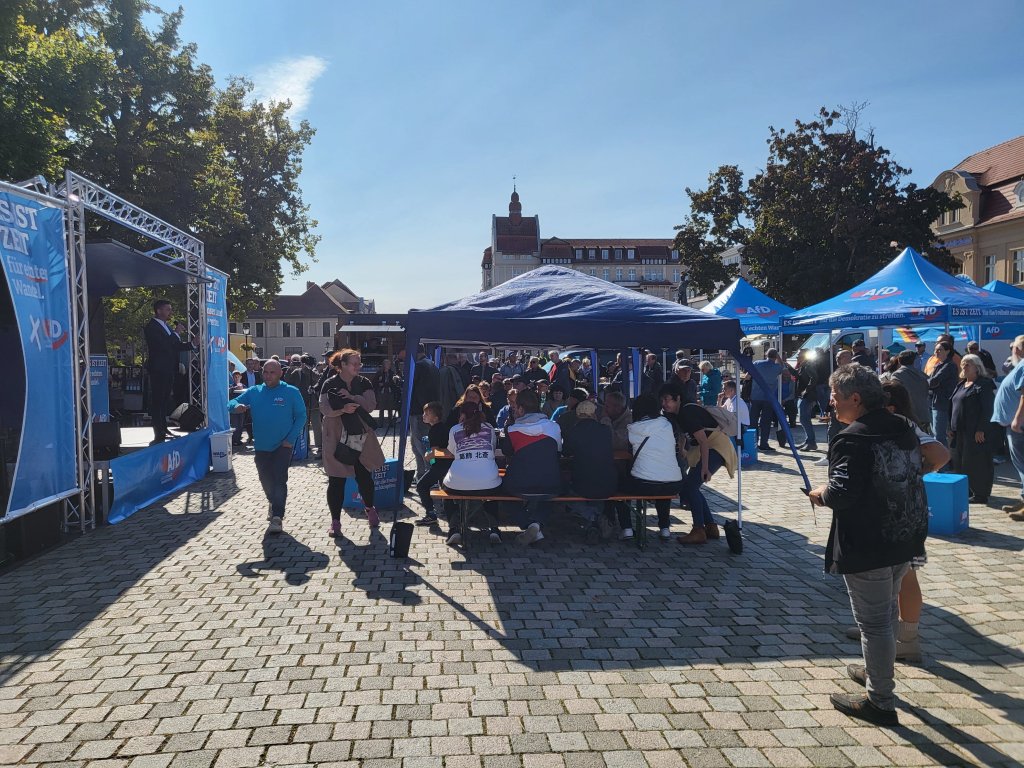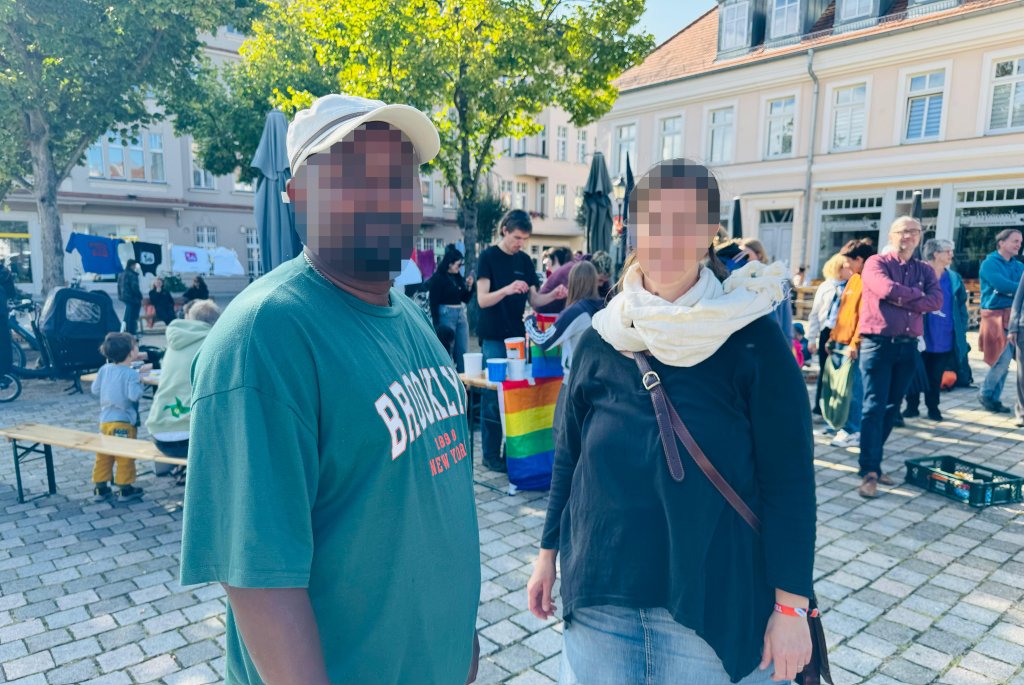Following a surge in support for Germany's anti-immigration AfD party in two state elections, NGOs are sounding the alarm over "rampant right-wing violence" against migrants. We spoke with fearful migrants in the Eastern state of Brandenburg, where the AfD could become the strongest party on September 22.
On a recent Sunday, around 80 people have gathered at a central square in Neuruppin, a city of 30,000 northwest of Berlin in the state of Brandenburg. Anti-nazi slogans are printed on t-shirts and decorate a car.
Sagni Fayisa, which isn't his real name, has come with his German wife and their two children. The teacher says he faced racism and xenophobia ever since he moved from Ethiopia to Germany nine years ago, but things have gotten progressively worse since around 2020.
"Almost every single day nowadays people drive by me saying the N-word. Just between my school and my home, I'm sometimes insulted by three people," Fayisa tells InfoMigrants. "We recently got an offer to buy a house, but we couldn't decide because we are afraid, so we missed the chance. It's really difficult for us. Do we have to run away and go somewhere?"
On the other side of the square, a slightly larger group of people has gathered for a pre-election party of the far-right Alternative for Germany, or AfD. One of the speakers is Hannes Gnauck, a Member of Parliament and leader of the AfD's youth organization, which has been classified as right-wing extremist by Germany's Office for the Protection of the Constitution.
"For us, the following applies in every policy area: Germany first," Gnauck says during his 20-minute speech. "In one year, we'll chase the government out of their offices, and then we'll do politics for our own people again. If we are going to deport them, then let's not hand these rapists and murderers another 1,000 euros."
Despite -- or because -- of its anti-immigrant rhetoric, plans and actions, the AfD achieved electoral successes in EU, local and state elections in the past few months.
In some regions in Germany, especially in Eastern Germany, the partly far-right extremist party is now the strongest political force. In the state of Thuringia, one in three people voted for the AfD on September 1; in Saxony, only the conservative CDU performed better.
Read more: As Europe shifts further right, migrants fear for their futures
'Our country is in a discrimination crisis'
Concerns and fears of migrants about their future in Germany and their own safety are far from irrational: A series of recent statistics, surveys and studies show how a dramatic increase in right-wing violence puts people with a migration background at risk, particularly in East Germany.
Last Tuesday (September 10), Germany's federal anti-discrimination commissioner Ferda Ataman warned that "this shift to the right" went hand in hand with a "discrimination crisis" that "has left a mark on people in our country."
According to Ataman, the number of those seeking advice has increased from year to year: From 2021 to 2023, more than 20,000 people contacted the Federal Anti-Discrimination Agency. "The more successful right-wing extremists are in elections, the more people apparently consider their attitude to be legitimate," she said.
The number of reported crimes motivated by right-wing extremism has reached an unprecedented level. In the first six months of the year, Germany's Federal Criminal Police Office registered 318 such acts -- that's close to two every day. The real figure is thought to be much higher, and refugees and people with a migration history are reportedly particularly at risk.
Fayisa, the Ethiopian teacher, remembers a particularly menacing situation when he picked up his son from school a few years ago: "I saw someone smoking who looked really angry," he recalls. "When we were leaving, the same guy was standing there with a knife. I immediately picked up my son and started running. He ran after me. Luckily, police came and he was arrested."
Fayisa says the experience shook him to the core. He now tries to avoid going outside without his wife, and they always accompany their older son wherever he goes.
Also read: Huge anti-racism protests in UK follow violent unrest
Growing willingness to use violence against migrants
The AfD has been agitating against immigrants since its founding in 2013. Earlier this year, the revelation of their "remigration" plan caused large-scale protests across the country.
AfD politician Gnauck rejects the claim that AfD politicians' words and actions have contributed to the rise in right-wing violence and the readiness among AfD supporters to use violence.
"This has nothing to do with our electoral successes here in the East and at the federal level. After all, we are not militantly revolutionary at our demonstrations and summer parties. We are not inciting violence," he told InfoMigrants after his speech in Neuruppin.
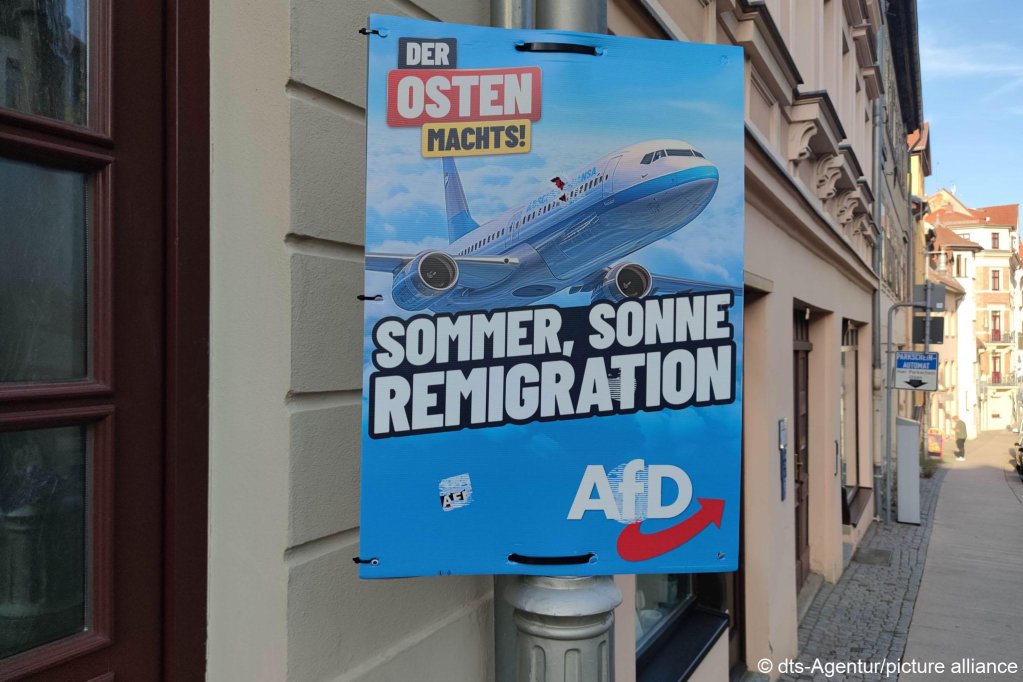
But Joschka Fröschner from the association Opferperspektive, German for victims' perspective, believes that the everyday racism migrants in Germany face, people of color in particular, has a lot to do with the AfD's rhetoric.
"If all the time you paint migrants as a danger, as criminals, as people only here to live on welfare, of course you're painting a target on their back," he told InfoMigrants. "We witness attacks here in Brandenburg with the perpetrators saying: 'You'll see, the AfD will come to you.' Even if the AfD denies sending that message, it's clearly taken up by people on the street."
According to recent surveys by polling institute pollytix and Princeton University, a growing number of AfD sympathizers approve of violence against migrants and politicians of democratic parties as a means to influence political processes and drive away migrants.
Read more: How Germany's AfD party tries to win over voters from immigrant backgrounds
One in four migrants consider leaving Germany
It is perhaps no surprise, then, that a recent survey by the German Centre for Integration and Migration Research (DeZIM) found that almost one in four people with a migration background are considering leaving Germany in light of the AfD's rise.
According to the Germany-wide survey, which DeZIM says was conducted in March 2024 among around 3,000 people, close to one in ten have already made concrete plans.
Moreover, more than one-third of respondents said they are toying with the idea of moving to a different state in the event of the AfD participating in their state government. One of them is a doctor from Egypt who works for the local hospital in Neuruppin:
"We are thinking about moving away, especially my wife. She wears a headscarf and is afraid that she will experience even more discrimination," says the doctor, who wanted to stay anonymous. "She has told me several times that we have to go somewhere in West Germany or just get out of Germany altogether. I don't understand how the economy is supposed to function without foreigners. In our hospital, at least 40 percent do not have a German passport."
According to Germany's Federal Employment Agency, the number of foreign employees in Brandenburg has increased almost fivefold in the last ten years.
Read more: Immigrants in Germany's east wary of rising far-right AfD
'Disastrous' consequences
Experts are warning that large-scale emigration would have "disastrous" consequences for Germany's economy, democracy and social cohesion.
"[Them leaving] would mean a loss of knowledge, expertise and economic capacity that is almost impossible to cope with, especially for eastern Germany," Gert Pickel, Professor of Church and Religious Sociology at the University of Leipzig is quoted in the DeZIM study. "In addition, such an image would make it virtually impossible to attract skilled workers."
Numerous studies have shown that the German economy and society heavily depend on foreign workers, both skilled and unskilled, which is mainly due to the aging population. According to the Institute for Employment Research (IAB), for instance, net immigration of at least 400,000 people per year is necessary in the long term.
The medical field is a clear example: The aforementioned state of Thuringia, where the AfD is the most popular party, relies on medical professionals from abroad. Roughly one in four doctors who work in hospitals in Thuringia do not have German citizenship. More than 300 hail from Syria alone.
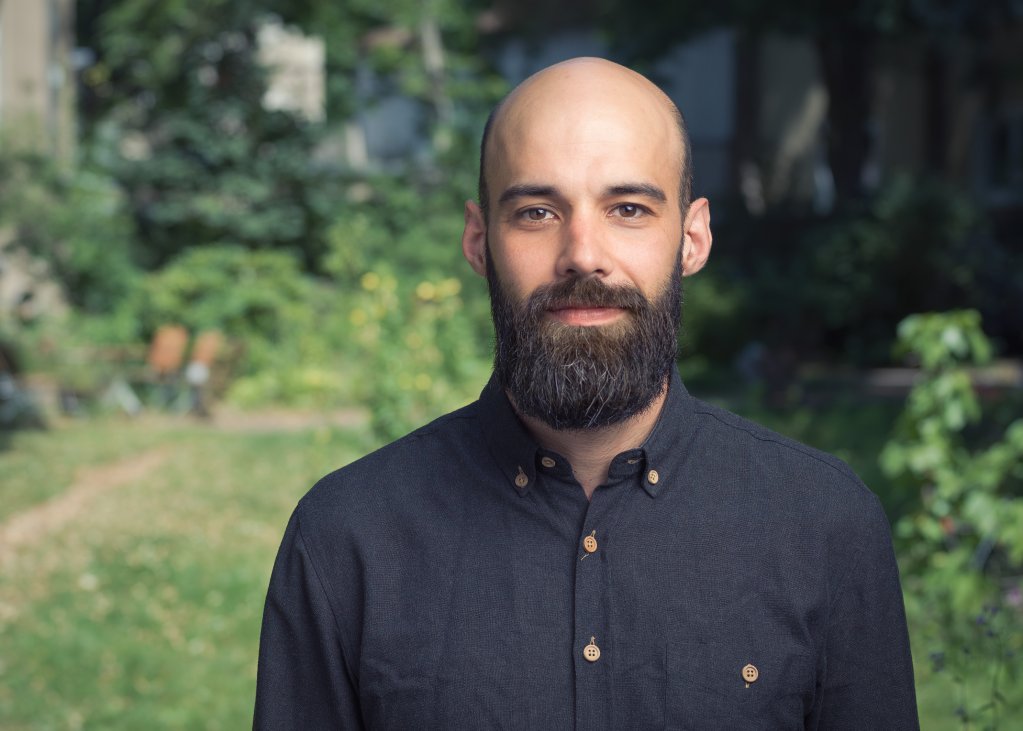
Joschka Fröschner from the association Opferperspektive says his biggest concern in case the AfD will be in power is the pledged cut of state support for migrants and victims of far-right violence, such as victim counseling centers. In Thuringia, for instance, the AfD has publicly said it wants to get rid of civil society-driven pro-democracy projects, which received 6.1 million euros from the state budget last year.
Read more: Would-be migrant workers worried by growing racism in Germany
Little influence of migrant voters
This Sunday's state election in Brandenburg, where the AfD is currently polling at around 28 percent, will be a neck-and-neck race between the partly far-right extremist party and the ruling social democrats.

Nationwide, the Alternative for Germany lost around seven percentage points in support between January and June. Since then, however, it has recovered and is currently the second-most popular party ahead of the conservative CDU with an approval rating of 17 percent, or more than one in four voters.
Neither the Egyptian doctor nor the Ethiopian teacher are eligible to cast their ballot on Sunday yet. "Not having a say in Brandenburg's future pains me, especially given the state the country is in," the doctor told InfoMigrants. "Our numbers are growing, so it's important that more migrants can vote, too."
Both of them hope they can make their votes count in the next federal elections though, which are expected to take place in late summer or fall 2025 -- if they don't leave the country before then.
The percentage of the 25 million people with a migration history, or around 30 percent of Germany's overall population, who are eligible to vote remains low, especially among those from countries like Syria, Nigeria, and Afghanistan who have arrived in Germany since 2015.
Joschka Fröschner from the association Opferperspektive warns that Germany's expanded border controls and other actions taken by the government coalition as a response to last month's deadly knife attack by a Syrian asylum seeker are playing into the hands of the AfD at the polls.
"At the moment, it seems like the democratic parties are playing the game of the AfD by trying to adopt their policies to regain votes. In a way, this is more dangerous than the AfD itself: Instead of supporting migrants and sending a clear sign that Germany is a country where people are welcome no matter their color of skin or their country of origin, parties are willing to tighten asylum laws and engage in racist rhetoric."

